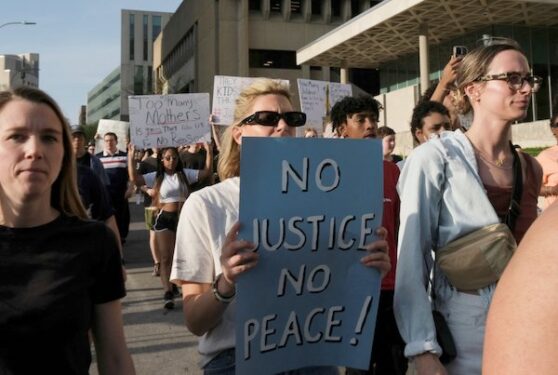
PROSPECT HEIGHTS — After a spate of shootings across the country, a U.S. bishop has said that offering thoughts and prayers after a tragedy, though necessary, is not a sufficient response to the issue of gun violence that plagues the nation.
“I don’t think we can allow ourselves to be passive,” said Bishop Timothy Doherty of Lafayette, Indiana.
“Without some serious adjustment in personal and social priorities, we will continue to expect health care professionals to spend more time tending to survivors of gunshots, or first responders training to offset avoidable threats, rather than spending energy on maintaining good order,” he said.
According to the Gun Violence Archive, which has tracked all gun-related injuries and deaths in the U.S. since 2013, as of April 25 there have been 13,285 gun violence deaths in the U.S. this year, 7,590 of which were suicides, and 5,695 were either homicides or accidental.
There were 20,200 gun violence deaths in 2022, and 21,009 in 2021, the data show.
There’s been a national focus on gun violence after a number of tragedies.
Kaylin Gillis, 20, was shot and killed by a 65-year-old man on April 17 after she and three others accidentally turned into the wrong driveway while looking for a friend’s house in upstate New York.
Two days earlier, Ralph Yarl, 13, was shot by an 84-year-old man after he rang the wrong doorbell while looking to pick up his siblings in Kansas City, Missouri. Yarl suffered serious injuries, but is expected to make a full recovery. And on April 18, two teenage cheerleaders in Texas were shot, one critically, after she mistook a man’s car for her own in a supermarket parking lot near Austin.
On April 16, four people — between the ages of 17 and 23 — were killed and 32 were wounded after someone opened fire at a birthday party in Dadeville, Alabama – a small community northeast of Montgomery.
On April 10, five people were killed after a 25-year-old man opened fire at a bank in downtown Louisville, Kentucky, where he worked.
There was also a mass shooting on March 27, when someone broke into a Christian elementary school in Nashville and shot and killed six people – three children and three adults.
Bishop Doherty, whose statements were part of a column posted on April 25, said he wrote the piece not to address one type of gun violence, but to “call attention to how the widespread violent use of firearms is increasingly co-opting our preaching, whether at funerals for those who have ended their own lives with firearms, or at public prayers and funerals for those who are killed and injured by firearms.”
The U.S. Conference of Catholic Bishops last spoke on gun violence last summer, after 21 people were killed in a mass shooting in Uvalde, Texas, where four then-USCCB chairmen stated in a letter to Congress that “we must unite in our humanity to stop the massacre of innocent lives.”
The statement, signed by Archbishop Paul Coakley Oklahoma City, Archbishop Salvatore Cordileone of San Francisco, Archbishop William Lori of Baltimore, and Bishop Thomas Daly of Spokane, Washington, called for a national dialogue to address multiple aspects of the crisis — including mental health, the state of families, the valuation of life, bullying, and firearm accessibility.
They also called for “reasonable gun control measures,” including a total ban on assault weapons, and limitations on civilian access to high-capacity weapons and ammunition magazines. Congress has been unable to find common ground on the issue, with each party entrenched in its position.
“There is something deeply wrong with a culture when these acts of violence are increasingly common,” the four bishops wrote.
In his column, Bishop Doherty emphasized the need for the conversation around gun violence to shift from simply dividing people into pro- or anti- firearm camps. He said there needs to be a dialogue that includes families who have suffered, first responders, emergency department staff, school administrators, chaplains, and clergy who preside at visitations and funerals in the wake of violent acts, as well as people who are experts in firearm usage and ownership, all of whom “rightly have a voice and vote.”
Bishop Doherty also noted that firearms’ violence is not just a mental health problem, while adding that “if it is, a primary symptom is the assertion that reasonable limitations are out of reach.”
